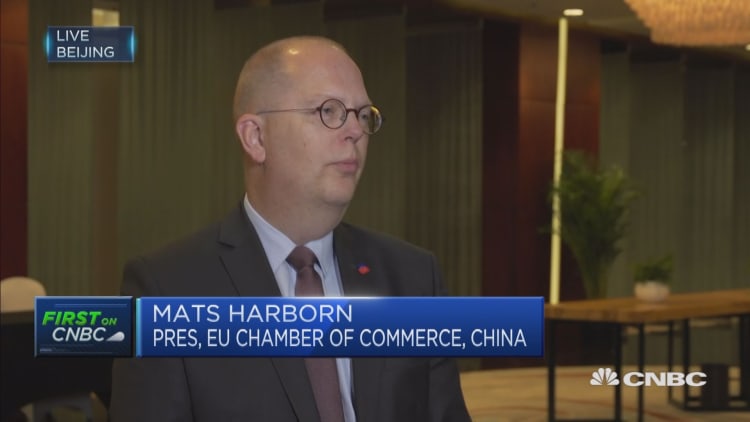
China needs to make good on its own repeated calls to open up its markets, or face consequences, warned the European Union Chamber of Commerce in China.
In recent years, China has publicly avowed to do so, with President Xi Jinping making speeches on openness and globalization. In January, China's State Council released a document on measures to promote fair, open markets and to attract more foreign investment. But critics say China's many words have few actions behind them.
"We don't know if China will implement its promises. As business people we have to be accountable for our business today, we can't build our future plans on only dreams," Mats Harborn, president of the EU Chamber of Commerce in China, told CNBC. "We need to have tangible measures from the Chinese state to show that China is going down the path of more openness."
European business "is suffering from accumulated 'promise fatigue,' having witnessed a litany of assurances over recent years that never quite materialized," the EU Chamber wrote in its latest paper. "It appears that in many areas, China is no longer opening up, but selectively closing up."
Foreign firms have long complained of an uneven playing field and an opaque regulatory environment when it comes to China. About 54 percent of European firms say they perceive they're treated less favorably than domestic companies, according to the Chamber.
The Chamber urged China to take advantage of a top leadership shuffle in October to move forward with reforms. The paper, which draws on observations and recommendations of the Chamber's more than 1,600 member companies, supports continued engagement between China and Europe.
It also calls for the Chinese government to allow foreign enterprises to take a greater role in setting industry standards and to have access to policies that support research and development.
Beijing must also find better ways to entice foreign investment and it should move away from setting up special trade and investment zones with short-term incentives. That practice isn't as successful in luring European firms, which make investment decisions based on market principles, such as the need to expand or to match growing demand, the paper said.
China's lack of reciprocity translates to less advanced offerings for its own citizens, the Chamber said. Without greater openness from China, it also means European governments have a harder time convincing their countries that trade and investment contribute to a better economic future especially when there are rising populist views against globalization.
"If China is ultimately unwilling to offer reciprocal access to its own market, it cannot assume that it will indefinitely continue to enjoy open and unhindered access to the EU's," the paper warned. "The liberal approach to [mergers and acquisitions] will only work if all parties move toward equal access and the removal of barriers, otherwise it is politically untenable."
Indeed, the amount of money flowing both ways is vastly different: Chinese investment into the EU remained stable at $10.4 billion in the first half of this year, while European business into China dropped by 23 percent to $3.7 billion during the same period.
As things stand, international companies must often find a local partner to work with in order to do business in the world's second-largest economy, a restriction that they worry could expose them to the theft of intellectual property or trade secrets.
And regulatory barriers are wide-reaching: A cybersecurity law that went into effect in June was so broad and vague that it created uncertainty for how businesses should operate, the Chamber said.
Another issue is China's practice of pilot programs — authorities "overcomplicated the process" by selecting 200 cities to trial health-care reforms, with each setting its own purchasing policy for medical equipment. That means companies have to plan for 200 different markets, noted the paper.
"It seems to us that the authorities often times are using the old tool box in the new world and that is causing regulatory frameworks to be blurred, unclear and unpredictable."
The Chamber also called out sectors that are shutting out foreign firms, including agriculture, food and beverage. A new requirement for shipments of low-risk food products to have an official inspection certificates from foreign governments only creates cost and burden to businesses, and seems more about protecting Chinese producers than about food safety, noted the paper.
Chinese authorities recently banned a variety of soft cheese, such as French brie and camembert, and Italian gorgonzola, as the bacteria colonies on the dairy products weren't approved for import.
"We like cheese and we are now in discussions with the authorities to solve the problem," Harborn said. "We hope that through this dialogue we will come to a solution."


